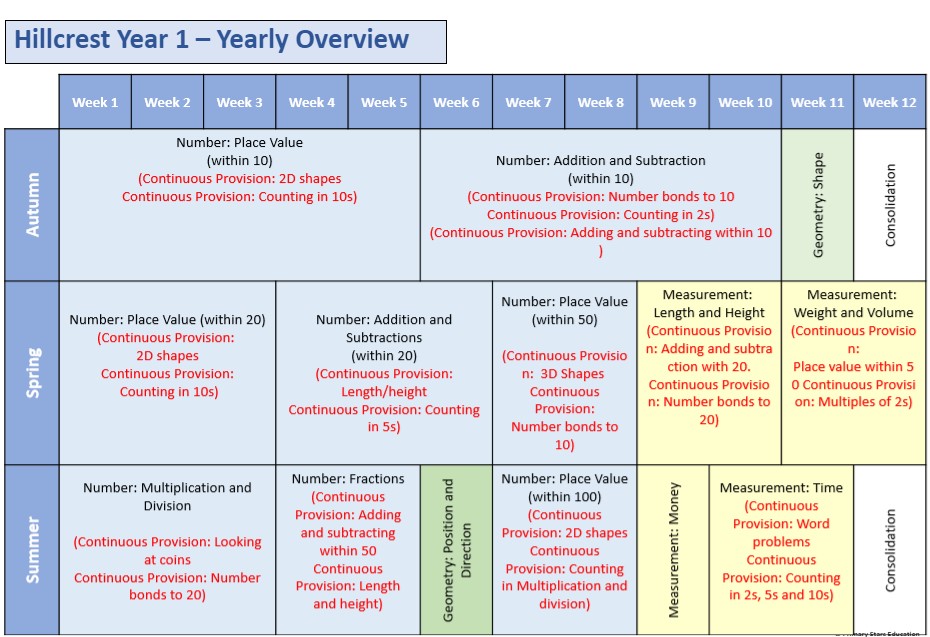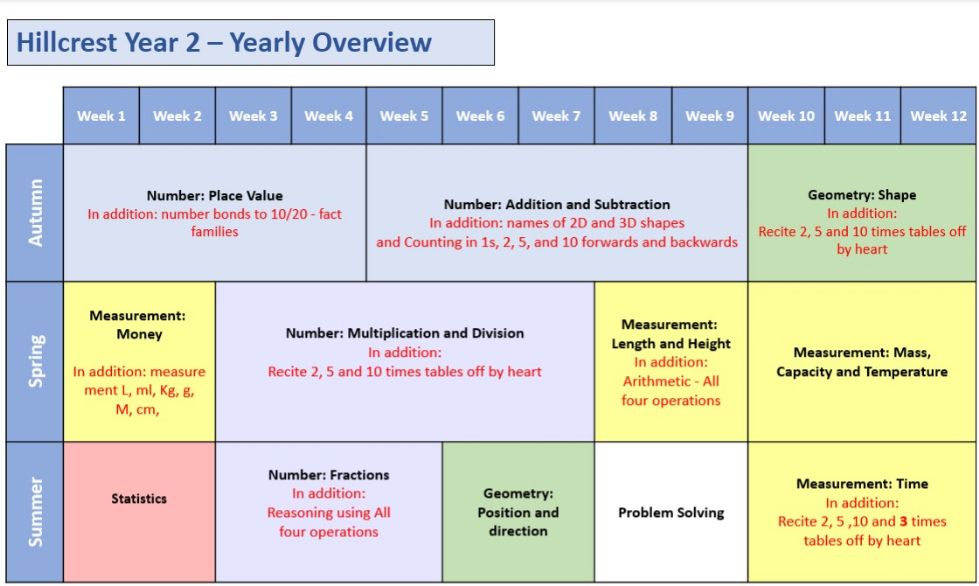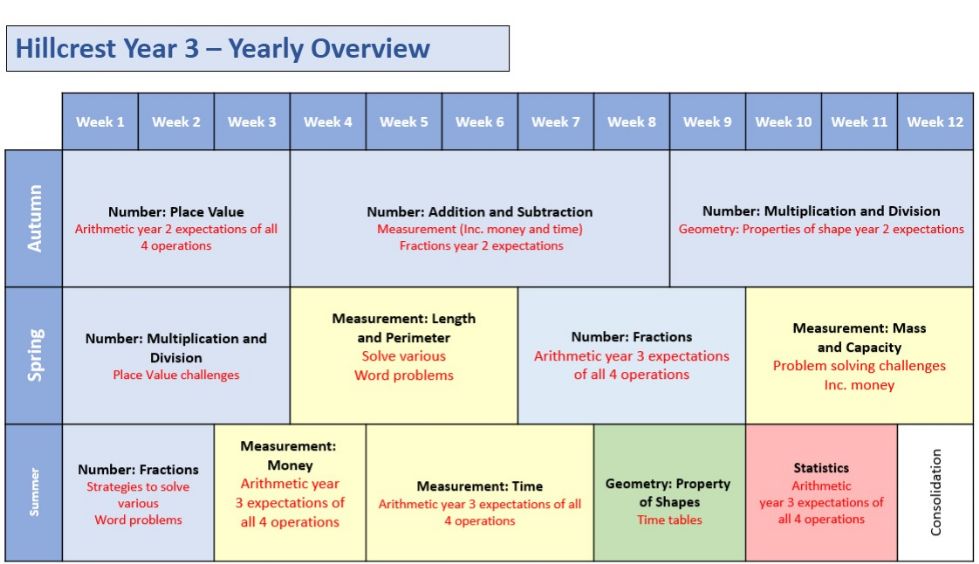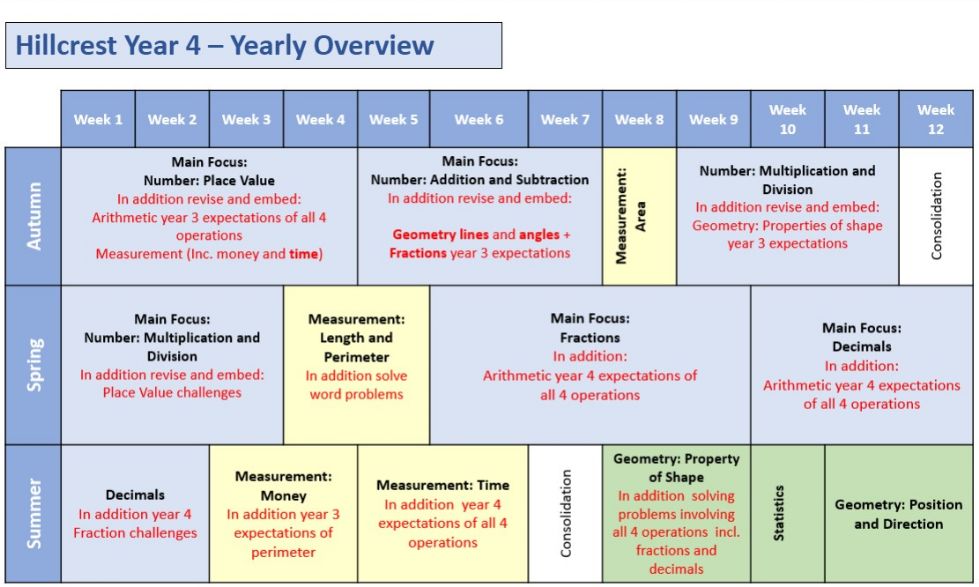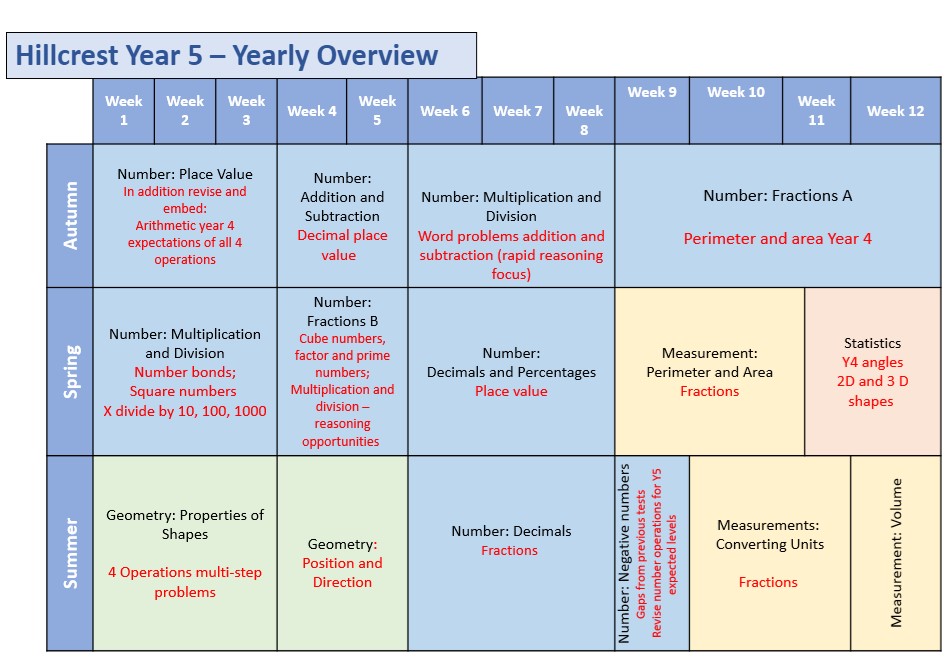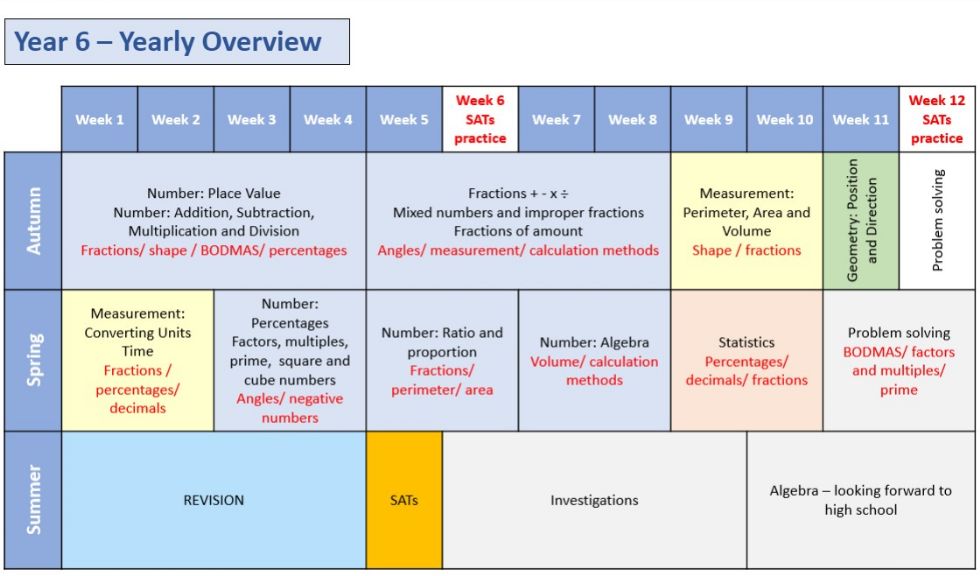Maths

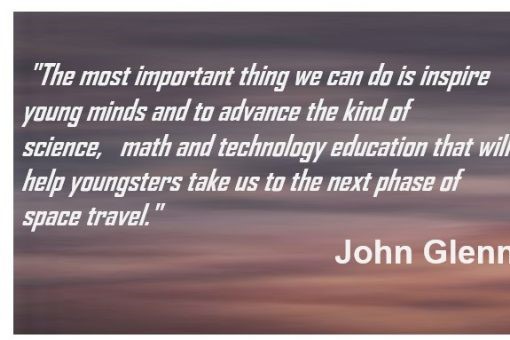
Hillcrest's 5 Principles of Maths
At Hillcrest, each subject team has created 5 key principles, outlining what makes up quality teaching in each subject:
|
1. Teachers will be teaching from White Rose – variations in Y2 & 6 |
|
|
2. Rich Maths discussions within lessons using mathematical vocabulary |
|
|
3. Mathematical resources accessible in lessons |
|
|
4. Current maths vocabulary displayed on working wall |
|
|
5. You will see children being challenged at the appropriate level – through task/questioning/support |
Click on the INTENT, IMPLEMENTATION and IMPACT bars below to discover why and how we teach Maths.
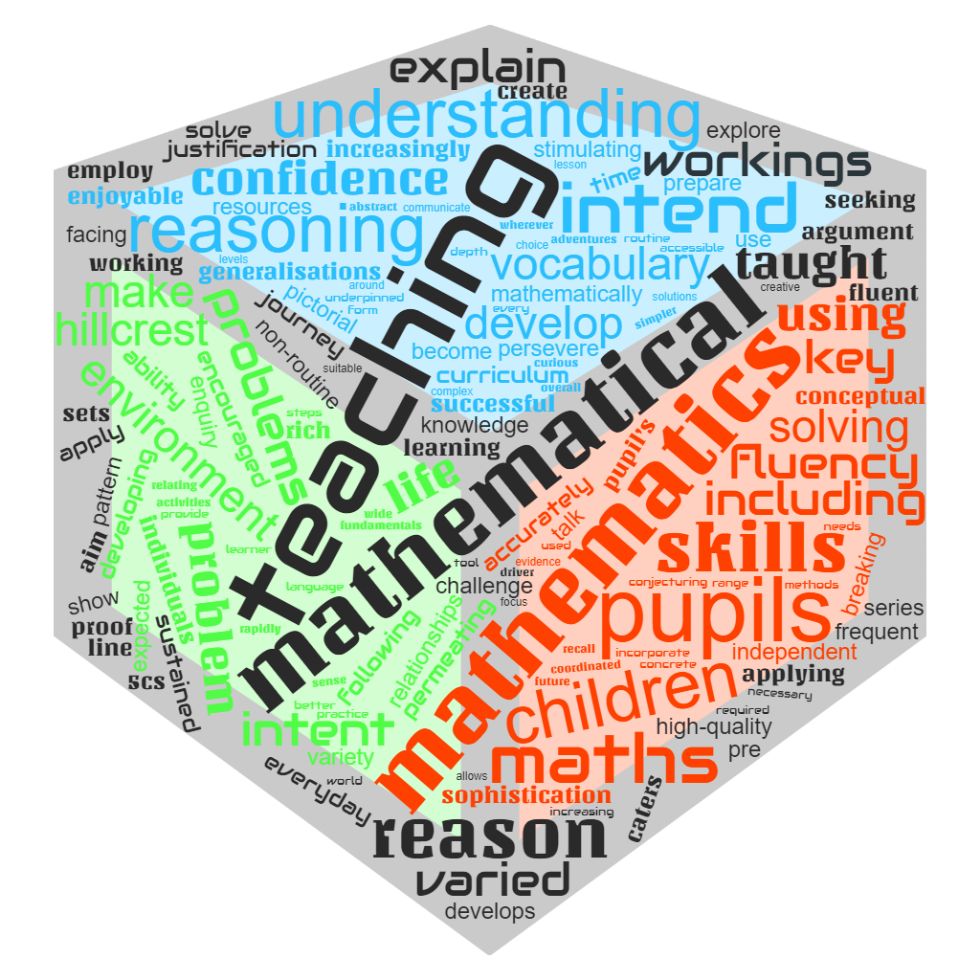
INTENT Statement for Maths
At Hillcrest, our intent is to make maths accessible, stimulating and enjoyable for all children.
When teaching mathematics, we provide a curriculum which caters for the needs of all individuals and sets them up with the necessary skills and knowledge for them to become successful in their future adventures. We aim to prepare them for a successful working life. We incorporate sustained levels of challenge through varied and high-quality activities with a focus on fluency, reasoning and problem solving. Pupils are required to explore maths in depth, using mathematical vocabulary to reason and explain their workings. A wide range of mathematical resources are used and pupils are taught to show their workings in a concrete, pictorial and abstract form wherever suitable. They are taught to reason their choice of methods and develop their mathematical reasoning skills. Permeating through each lesson, children are encouraged to employ their ‘Independent Learner’ skills- through the use of the 5Cs (Confidence, Curious, Creative, Communicate, Coordinated) - when facing a challenge in their learning journey. Overall, the Hillcrest curriculum allows children to better make sense of the world around them relating the pattern between mathematics and everyday life.
Our Intent is underpinned by:
The teaching of fluency
We intend for all pupils to become fluent in the fundamentals of mathematics, including through varied and frequent practice with increasingly complex problems over time, so that pupils develop conceptual understanding and the ability to recall and apply knowledge rapidly and accurately.
The teaching of problem-solving
All pupils are expected to solve problems by applying their mathematics to a variety of routine and non-routine problems with increasing sophistication, including breaking down problems into a series of simpler steps and persevere when seeking solutions.
The teaching of reasoning
We intend for all pupils to reason mathematically by following a line of enquiry, conjecturing relationships and generalisations, and developing an argument, justification or proof using mathematical language and evidence.
A vocabulary rich environment
We intend to create a vocabulary rich environment, where talk for maths is a key learning tool for all pupils. Pre teaching key vocabulary is a driver for every pupil’s understanding and develops the confidence of pupils to explain their understanding.
IMPLEMENTATION Statement for Maths
We implement our approach through high quality teaching delivering appropriately challenging work for all individuals. To support us we have a range of mathematical resources in classrooms including Numicon, Base10 and Place Value Counters. Some of our content is subject specific but a blocked curriculum approach has been implemented.
To ensure coverage and progression we use the White Rose scheme which builds on small steps within blocks and covers all the National Curriculum content. We also use a range of planning resources including Third Space Learning, NCETM and NRICH. In order to revise and build on prior learning, each year group has devised a spiral curriculum which is implemented in concise sessions throughout the day. Teachers will in addition plan ‘Creative Maths’ lessons that may link with outdoor learning when appropriate to ensure that Hillcrest Maths lessons are active and engaging. Through professional dialogue amongst colleagues, we continuously strive to better ourselves by frequently sharing ideas and resources that have been particularly effective. Further to this, we also take part in training opportunities and regional networking events.
Through our teaching, we continuously monitor pupils’ progress against expected attainment for their age, making formative assessment notes where appropriate and using these to inform our discussions in termly Pupil Progress Meetings and update our summative school tracker. The main purpose of all assessment is to always ensure that we are providing excellent provision for every child. We assess formally 3 times a year in Years 1 – 6 using White Rose termly progress checks (arithmetic and reasoning tests), which informs out teacher assessments and planning; the data is then recorded on the SmartGrade platform. Year 2 and Year 6 track progress throughout the year using past SATs papers. QLAs are used each term to show gaps in learning and to inform teachers with their planning. For children in EYFS, Continuous Provision allows for children to be assessed through observation and Early Learning Goals to ensure all children develop a firm mathematical foundation.
Homework is set to review and develop their learning. KS2 will complete tasks on MyMaths and children are encouraged to use Timestable Rock Stars and Numbots to practise multiplication and number bonds at home and are also given opportunities also at school. The teachers are able to monitor engagement with homework. Paper homework is provided for those unable to access the online learning platforms.
Children who have areas of development or gaps in their learning are targeted during lessons or supported using interventions such as Third Space Learning, Maths Talk, arithmetic or Precision monitoring.
IMPACT Statement for Maths
Pupil Voice
Children talk enthusiastically about their maths lessons and speak about how they love learning about maths. They can articulate the context in which maths is being taught and relate this to real life purposes.
Evidence of knowledge
Pupils know how and why maths is used in the outside world and in the workplace. They know about different ways that maths can be used to support their future potential.
Evidence of skills
Pupils use acquired vocabulary in maths lessons. They have the skills to use methods independently and show resilience when tackling problems.
Overall, we want pupils to:
-
Think mathematically for themselves
-
Make connections
-
Solve problems, discuss their ideas and reason confidently with others, and enjoy doing so.
-
To have a sense of number.
-
To appreciate the power (or beauty) of mathematics.
-
To be equipped mathematically for their futures.
Explore the blue banners below to find out more about what specific themes we teach in Maths and how these themes are revisited, recalled and expanded upon as the children journey through the school.

Year Group Overviews for Maths
Progression for Maths
Please find our calculation policy attached below!






